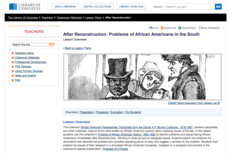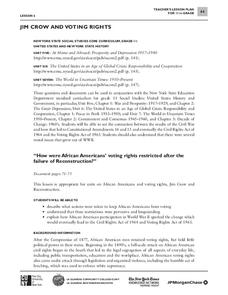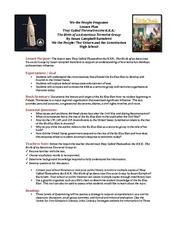College Board
2016 AP® United States History Free-Response Questions
The British and Spanish both had footholds in the New World, yet they had different approaches. Scholars explore the dynamics, along with the reasons behind immigration to the United States and business practices of the Gilded Age in a...
Carolina K-12
Group Project: Freedom Parade
Parades are a great way to celebrate. Get young historians into the festivities by asking them to create an informational float for a Freedom Parade. Picking a topic from the provided list or suggesting one of their own, class members...
Carolina K-12
African Americans in the United States Congress During Reconstruction
The Civil Rights Act of 1866, which granted citizenship to all males in the U.S., resulted in the first African Americans to be elected to Congress. Class members research 11 of these men, the challenges they faced, and craft...
National Constitution Center
Voting Rights since the Fifteenth Amendment
What does it mean to have the right to vote? To what extent have interpretations of the Fifteenth Amendment changed over time? Young historians examine and analyze primary source documents, an interactive website, and historical analysis...
Annenberg Foundation
Reconstructing a Nation
Think back to the aftermath of an family dispute. The awkwardness of having to make up, get along, and move forward can be very difficult. The tenth lesson of a 22-part series on American history examines the Reconstruction Era following...
Center for Instruction, Technology, & Innovation
Did African American Lives Improve After Slavery?
The Civil War made slavery illegal, but all ex-slaves were not totally free. Scholars visit eight different classroom stations to uncover life during the Reconstruction Era in America. Groups discover items such as Black Codes, 13th,...
Annenberg Foundation
Taming the American West
Have you ever seen a movie about the romance of the American West with its buffalo, horses, cowboys, and endless frontier? The 13th installment of a 22-part series on American history presents the myths associated with the American West....
University of California
The Civil War: Final Assessment
Pupils discover the true nature and purpose of the Civil War in the eighth and final installment of an informative series. Using primary and secondary documents, history buffs merge social study knowledge with English skills to create a...
University of California
The Civil War: Effects of the Civil War
Imagine being on the front line of the Civil War —from the front porch of your own house. Scholars use visual evidence from primary and secondary sources to analyze the impact of the Civil War on all Americans. They examine the research...
Bill of Rights Institute
Economics of the North and South Before the Civil War
How did economic issues lead to war? Viewers watch an AP review video to examine one of the main causes of the American Civil War, the Tariff of Abominations. They examine the issues concerning the economies of the North and South prior...
PBS
African American History: Climbing the Wall
Imagine the challenge of trying to trace your family genealogy if no records were kept of births and deaths. Where would you look for information? What types of documents could provide you with the information you seek? History...
Library of Virginia
Life as a Liberated People
Imagine having no control over your life and then suddenly having to provide for yourself. Such was the challenge faced by many American slaves after emancipation. Class members are asked to consider these challenges are they examine...
Pacific University Oregon
Civil Rights: US History
To gain an understanding of the Civil Rights Movement of the 1960s, class members investigate the Jim Crow Laws, the Emancipation Proclamation, the 13th, 14th, and 15th Amendments of the US Constitution, and the 1898 Supreme Court case,...
Center for History and New Media
Founding of the Laurel Grove School and Other "Colored" Schools in Fairfax County, 1860–1890
The right to public education was not always so clear in American history. Readers study several primary and secondary source documents, including property deeds, maps, and photographs, about the founding of local schools during the...
Center for History and New Media
The Impact of the Jim Crow Era on Education, 1877–1930s
Even though American slaves were officially emancipated in 1865, the effects of slavery perpetuated throughout the 19th and 20th centuries. Middle and high schoolers learn about the ways that discrimination and the Jim Crow laws...
Center for History and New Media
A Look at Virginians During Reconstruction, 1865-1877
The transition between rebellion to reunification was not smooth after the Civil War. Young historians compare primary and secondary source documents in a study of the Reconstruction era in Virginia, noting the rights that were not...
Library of Congress
After Reconstruction: Problems of African Americans in the South
Lynchings, race riots, and Jim Crow laws were just a few examples of antagonism that African Americans faced after Emancipation. Class groups investigate these and other events, and prepare a presentation to inform the class about the...
Alabama Department of Archives and History
Alabama Tenant Farmers and Sharecroppers, 1865 to Present
The tenant farming and sharecropping systems that developed in the South after the Civil War, the reasons for their development, and the eventual decline of these systems are the focus of this two-day plan.
City University of New York
Jim Crow and Voting Rights
Class groups examine primary source documents to determine how the voting rights of African Americans were restricted after the failure of Reconstruction, and how African American participation in World War II lead to change.
Middle Tennessee State University
Fights, Freedom, and Fraud: Voting Rights in the Reconstruction Era
As part of a study of post Civil War era, young historians investigate the changes in voting rights during the Reconstruction Era (1863-1876), the fraud involved in the Hayes-Tilden presidential election of 1876, and efforts by Pap...
Curated OER
The Called Themselves the K.K.K.; The Birth of an American Terrorist Group
How did Ku Klux Klan develop and flourish in the US? How did the government respond to acts of terrorism conducted by the KKK following the Civil War? How does the government respond to acts of terrorism today? This resource launches a...
Curated OER
After Reconstruction: Problems of African Americans
Students describe issues or problems facing African Americans following Reconstruction. They explain possible solutions to these problems suggested in the sources you find, and cite arguments for and against these solutions.
Curated OER
Slave Narratives: Constructing U.S. History Through Analyzing Primary Sources
Learners access oral histories that contain slave narratives from the Library of Congress. They describe the lives of former slaves, sample varied individual experiences and make generalizations about their research in journal entries.
Curated OER
Forty Acres? The Question of Land at the War's End
Should land be redistributed to former slaves after the Civil War? This essential question guides a lesson on the Reconstruction Era, as learners analyze primary sources (linked), recording responses on a worksheet (linked). To model the...

























